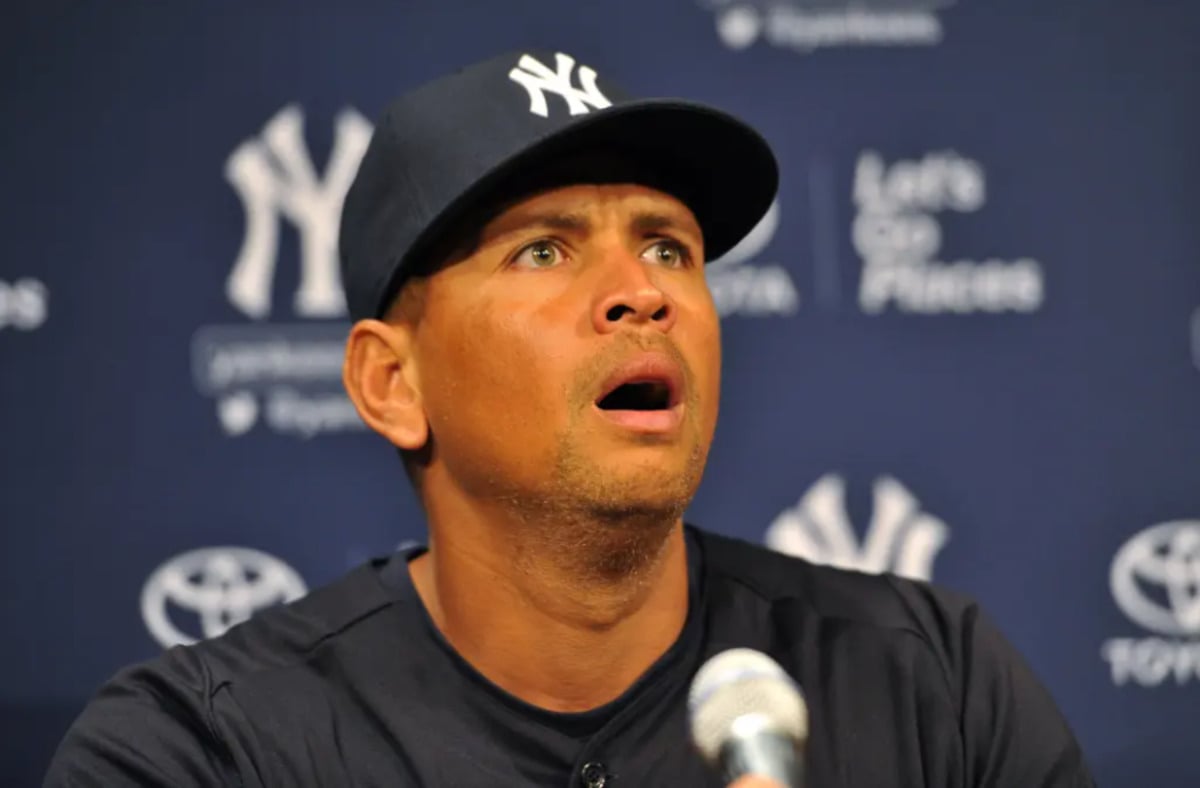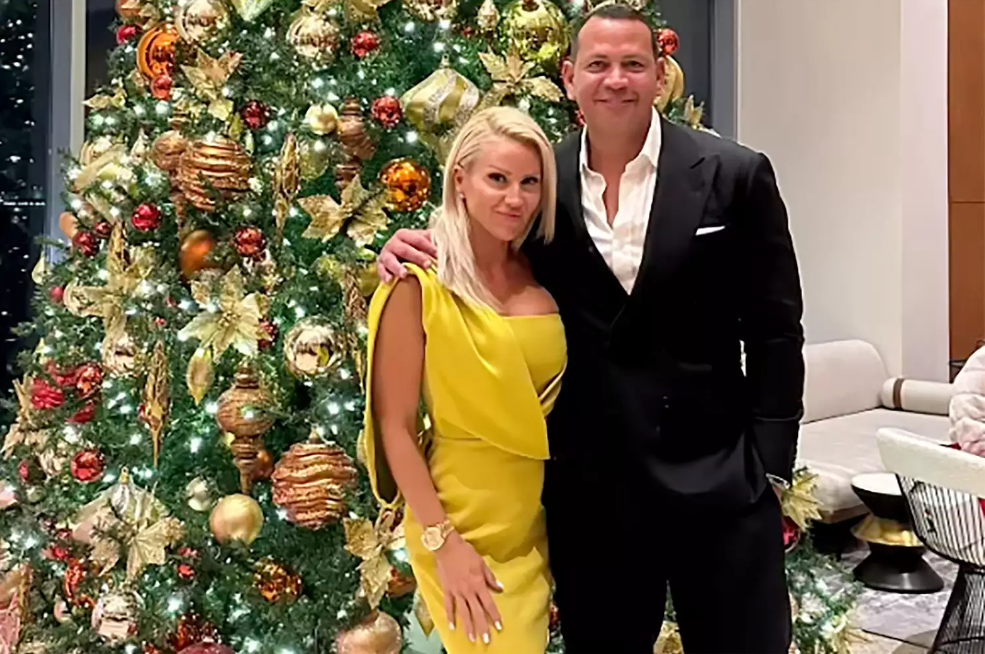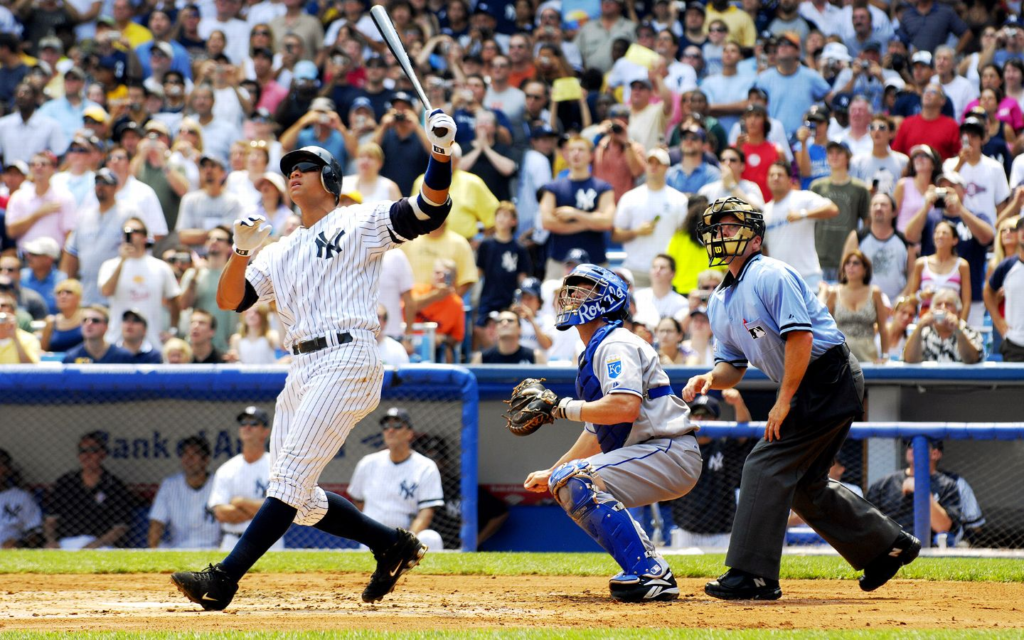Alex Rodriguez DEA documents make explosive revelations on Biogenesis scandal


Josh Barrett
More Stories By Josh Barrett
- Mother’s Day: How Anthony Volpe’s mom molded him into a Yankee phenom
- Aaron Judge on verge of joining elite Yankees club, finds inspiration in Winfield, Jeter, CC
- Steinbrenner ‘got ears’ to hear Yankees’ challenges, yet no gurantee of change
- Michael Kay’s show heading to December ending amid uncertainty over ESPN deal
- Yankees’ Gleyber Torres projected to sign with NL West contender
Table of Contents
In 2014, Alex Rodriguez was suspended by Major League Baseball for the entire upcoming season after he was found guilty of using drugs to enhance his performance. Even worse, he tried to hinder MLB’s investigation into his involvement with the Biogenesis doping scandal. Despite being a perennial All-Star, Alex Rodriguez was a controversial figure in the baseball world. At that point in 2014, he was 38 years old, had recently undergone two hip surgeries, and his damaged reputation was about to cost him his $25 million a year salary from the Yankees.
In January 2014, Alex Rodriguez, who was then a third baseman for the New York Yankees, went to Weston, Florida for an interview at the U.S. Drug Enforcement Administration’s Miami Division offices. During this interview, Alex Rodriguez had a special legal status called “Queen for a Day,” which meant that anything he said to the authorities couldn’t be used against him in future legal actions. However, he still had to tell the truth, or else he could face serious charges for lying to federal agents.
What was said during that closed-door meeting, along with what others involved in the DEA’s 21-month investigation of Biogenesis shared with the agents, creates a much darker picture than the confident and smiling Alex Rodriguez that we see today. He has undergone one of the most remarkable image transformations in American sports history. The information gathered from the investigation makes it even more surprising that he later became a prominent announcer and ambassador for Major League Baseball.
During his conversation with federal agents, Alex Rodriguez finally confessed to using performance-enhancing drugs that he had bought from Tony Bosch, the operator of the Biogenesis clinic. This was the first time Alex Rodriguez admitted to it, even though he had strongly denied it after the arbitrator’s decision, leading his lawyers to file short-lived lawsuits against MLB and the players’ union.
What’s more, the interview notes from DEA investigative files, which ESPN obtained for the first time, give a comprehensive account of the relationship between Alex Rodriguez and Bosch. They detail how they initially connected, the strategies they used to dodge drug tests, their eventual falling out, and an unsuccessful attempt to cover up their actions. These federal documents also reveal the involvement of other well-known athletes who were previously unknown to be part of the investigation.

The unredacted documents reveal the extreme measures taken by Alex Rodriguez and his team to hinder and discredit Major League Baseball’s investigation. They outline how the Yankees’ third baseman initially attempted to bribe Bosch and later, Alex Rodriguez resorted to drastic tactics to protect his reputation.
According to the records, Team A-Rod covered Bosch’s legal fees in Miami, even though both Bosch and Alex Rodriguez publicly denied any involvement between Bosch and the baseball player. They also paid for the purchase of drugs for Bosch’s remaining athlete clients when his clinic closed. Depending on the accounts given by witnesses to federal agents, either Alex Rodriguez’s group offered or Bosch requested hundreds of thousands of dollars for him to leave the country at the peak of the MLB investigation.
Finally, the documents show that Major League Baseball (MLB) officials thought that Alex Rodriguez’s camp made Bosch feel so unsafe that the commissioner’s office ended up spending nearly $2 million on his personal security. This amount was double what they initially planned to pay. The agreement between MLB and Bosch ended up costing the league over $5 million, which included additional expenses like lawyer fees and temporarily housing him in luxury hotels and million-dollar condos in Miami.
The documents ESPN received contain around 1,400 pages of notes from the DEA (Drug Enforcement Administration) related to the federal investigation into the largest doping program in American sports. This investigation officially began about ten years ago. These documents, referred to as DEA-6 reports internally, serve as a record of the DEA’s inquiry into drug distribution. They consist of notes taken by federal agents during interviews with around a dozen professional athletes, clients, and employees of Biogenesis, as well as confidential sources. The files also include summaries from surveillance operations, some of which used DEA helicopters, undercover purchases, and executed search warrants. When combined with ESPN’s exclusive reporting, these documents provide the most comprehensive account of Alex Rodriguez’s involvement in the scandal.
Alex Rodriguez’s admission
#1. As part of the investigation, Alex Rodriguez provided the names of three former or then-current players who, according to him, Tony Bosch had mentioned as clients using performance-enhancing drugs (PEDs): Manny Ramirez, Ryan Braun, and another All-Star player. Among these players, the third one was not previously on the radar of federal investigators. This player never tested positive for PED use, had not been interviewed by authorities, and had not faced any suspension from Major League Baseball (MLB). ESPN attempted to contact this player through his agent but was unsuccessful. The agent mentioned that Biogenesis was a topic none of his clients wanted to revisit.
#2. Alex Rodriguez admitted to usually giving Bosch $12,000 every month for doping plans that involved using testosterone creams, red, gummy-like lozenges containing testosterone, and human growth hormone. This went on from late in the 2010 season until October 2012. Alex Rodriguez also informed federal agents that his cousin, Yuri Sucart Sr., had been the person providing him with performance-enhancing drugs (PEDs) for at least ten years. When asked about this, Sucart chose not to comment on this story.
#3. To keep his dealings with the hormone specialist and the operator of the anti-aging clinic a secret, Alex Rodriguez paid Bosch in cash without any trace of involvement. He explained to agents that he would write checks from his business account to his cousin Sucart, who initially served as an intermediary to pass the cash to Bosch. At times, Rodriguez mentioned that payments were made using “petty cash” taken from the Yankees’ team secretary who traveled with the team. This secretary didn’t know how the money, which came from Alex Rodriguez’s earnings, was being used.

#4. He informed the authorities that he ultimately dismissed Sucart after conducting a thorough forensic accounting review of his bank accounts. This analysis revealed that his cousin spent a significant amount, somewhere between $250,000 to $500,000, of his money without obtaining proper approval.
#5. The player disclosed that on Christmas Eve in 2012, Sucart demanded $5 million to keep quiet about Alex Rodriguez’s dealings with Bosch and not report them to Major League Baseball. Alex Rodriguez then informed federal agents that he later made a confidential financial arrangement with Sucart to prevent him from revealing his private matters. However, Sucart’s side suggests that it was actually A-Rod who initially proposed a confidential agreement earlier in the month. However, they couldn’t initially agree on the financial terms of the arrangement.
#6. Alex Rodriguez also shared confidential personal details about Sucart, which ended up involving other people in the federal investigation. This included revealing information about his married cousin’s girlfriend.
#7. Alex Rodriguez admitted to not telling the truth when New York Yankees president Randy Levine called him in November 2012, which was about a month before the Biogenesis scandal became public. Levine asked Alex Rodriguez if he had any knowledge about Bosch, to which A-Rod falsely replied that he didn’t have any relationship with Bosch.
#8. When Major League Baseball (MLB) interviewed Alex Rodriguez several months after the November phone call, he chose not to respond to questions regarding his connection with Bosch. He cited the Fifth Amendment as his reason for not answering.
#9. Alex Rodriguez informed the investigators that Bosch noted his testosterone levels were low for a man of his age based on a blood analysis. Although this wasn’t directly related to the doping plan, Alex Rodriguez also admitted to illegally obtaining Cialis and Viagra from Bosch. He told the investigators he did so for recreational purposes.
Players’ names leaked as a ploy
During the peak of the Biogenesis investigation, CBS’ “60 Minutes” aired a report that suggested Alex Rodriguez’s close associates had released documents that initially linked his teammate at the time, Francisco Cervelli, and Milwaukee Brewers outfielder Ryan Braun, to the doping scandal. The report claimed that Alex Rodriguez’s team leaked these documents to Yahoo Sports. He, however, denied this allegation.

Cervelli had no comment when contacted by ESPN, and Braun chose not to comment both through his father and his long-time agent.
A-Rod’s public relations team adopted an aggressive strategy that resulted in almost daily controversies. A source close to Alex Rodriguez described it as a full-blown battle against MLB. This included various confrontations, such as accusing the Yankees of offering him subpar medical treatment and launching personal attacks against individuals like Yankees general manager Brian Cashman and high-ranking MLB officials.
A Yankees source commented that A-Rod essentially tried to divert attention away from his own actions. The source further mentioned that Alex is a complex individual with many facets, and he believed he felt regret, but he harmed many people with his actions.
Alex Rodriguez, who has been working as a baseball analyst with ESPN since the 2018 season, chose not to provide a comment for this story. He has been reached out to multiple times in the past six months through his publicist, Ron Berkowitz. At one point, Berkowitz requested that a reporter email an overview of the story along with some potential questions. However, after that, the publicist did not respond to phone messages or emails.
A little over ten years ago, Alex Rodriguez found himself at the center of a federal criminal case when baseball officials shared information with the DEA connecting Bosch and Sucart, A-Rod’s cousin and personal assistant. Several players had recently faced suspensions due to failed drug tests caused by elevated testosterone levels. This testosterone was described by current commissioner Rob Manfred at A-Rod’s arbitration hearing as the most powerful anabolic steroid.
The DEA’s investigation resulted in eight convictions, including Bosch’s. He pleaded guilty to a conspiracy related to distributing testosterone and received a four-year federal prison sentence. However, he was released in late 2016 and remained on probation for another three years. Bosch’s sentence was shortened because he cooperated with authorities.
No athletes or users faced charges from the authorities.
Tangible proof against A-Rod

Alex Rodriguez had met with federal authorities four months before Bosch disclosed information about the origin of the testosterone cream. It seems that authorities did not follow up with A-Rod regarding the claims made by the anti-aging clinic operator.
In the early stages of the investigation, Bosch informed the authorities that Alex Rodriguez was using twice as much as the others in terms of the substances he provided to the players. As an example, he mentioned that A-Rod bought two tubes of a cream containing 10% testosterone every month, whereas other players only purchased one.
During an interview with the DEA, Bosch’s ex-wife stated that he bragged about making a significant amount of money from his star player. This led her to request an increase in child support payments from Bosch.
Bosch’s former girlfriend in Miami shared with investigators that Bosch described Alex Rodriguez as his highest-paying client. She also mentioned that she drove Bosch to treat Alex Rodriguez at his Miami Beach residence during the offseason. After the treatment, Bosch told her that A-Rod became upset because he had difficulty finding a vein, which resulted in blood everywhere. According to Bosch, A-Rod was frustrated and said he didn’t know what he was doing, so he asked him to leave.
Two employees from the clinic also shared stories about driving Bosch to meet with Alex Rodriguez. One of them recounted a late-night trip to meet A-Rod, where she ended up falling asleep in her car while waiting. Bosch returned with a bundle of cash and gave her $300. The other employee mentioned driving Bosch to a Starbucks, where he met with A-Rod and received money from him.
For many years, Alex Rodriguez consistently denied or played down any connections to performance-enhancing drugs (PEDs). In 2007, during an interview with CBS’ Katie Couric, he stated that he never used such substances. Two years later, when reports emerged that he failed an MLB survey test in 2003 while playing for the Texas Rangers, he blamed his cousin Sucart. Rodriguez claimed that Sucart bought over-the-counter drugs in the Dominican Republic, and those drugs were tainted. During the Biogenesis scandal, A-Rod once again tried to undermine the allegations and asserted that he had been deceived by his cousin.
Between March 2012 and the scandal becoming public by the end of that year, A-Rod and Bosch had more than 500 text message exchanges, as shown in documents from Alex Rodriguez’s MLB arbitration hearing. They also had 53 phone conversations. In their text messages, they referred to substances using vague terms like “food” and more specific code names like “gummies” (which contained testosterone), “pink food” (a cream with testosterone), “liquid soup” or “red liquid” (a liquid form of testosterone troche), and “cohete” or “rocket” (a syringe containing human growth hormone or IGF-1).
Unlike Melky Cabrera and Ryan Braun, Alex Rodriguez never failed a drug test while under Bosch’s supervision. Documents from MLB’s arbitration hearing revealed that the league conducted drug tests on Rodriguez at least 10 times while he was associated with Bosch.

Alex Rodriguez informed federal authorities that Bosch injected him twice, specifically on October 16 and 18, during a series of games. The substance injected was a red liquid that A-Rod believed contained vitamins. However, Bosch stated that it actually contained “growth hormone and some peptides.” While he was still in Detroit, Alex Rodriguez received a call from the Yankees’ long-serving trainer, Steve Donohue, who told him that he was scheduled to undergo a drug test. Records from A-Rod’s arbitration hearing show that he was tested on October 17.
The result of the urine test was negative, meaning Alex Rodriguez passed it.
According to Bosch, Alex Rodriguez not only consumed a testosterone gummy before game time but also learned to self-inject a small syringe containing IGF-1 and vitamins. He mentioned regular use of the peptide CJC 1295, took DHEA in the evening, and used amino acids daily as needed. All of this information is documented in the Biogenesis Clinic notebooks.
However, the question remains: Did this elaborate doping routine truly improve Alex Rodriguez’s performance? By that time, he was considered older and more prone to injury by baseball standards. So, while the performance-enhancing drugs might have assisted in keeping him on the field, it’s still a matter of debate.
In the two-plus seasons under Bosch’s supervision, roughly from August 6, 2010, through the 2012 season, Alex Rodriguez achieved a batting average of .276 with 47 home runs in 257 games. During five postseason series in the Bosch era, which included 21 games and 75 at-bats, Alex Rodriguez’s performance was far from stellar, as he batted just .160 with two extra-base hits, neither one of them clearing the outfield wall.
What do you think? Leave your comment below.
- Categories: alex rodriguez, scandal
- Tags: alex rodriguez, scandal


 Follow Us
Follow Us









